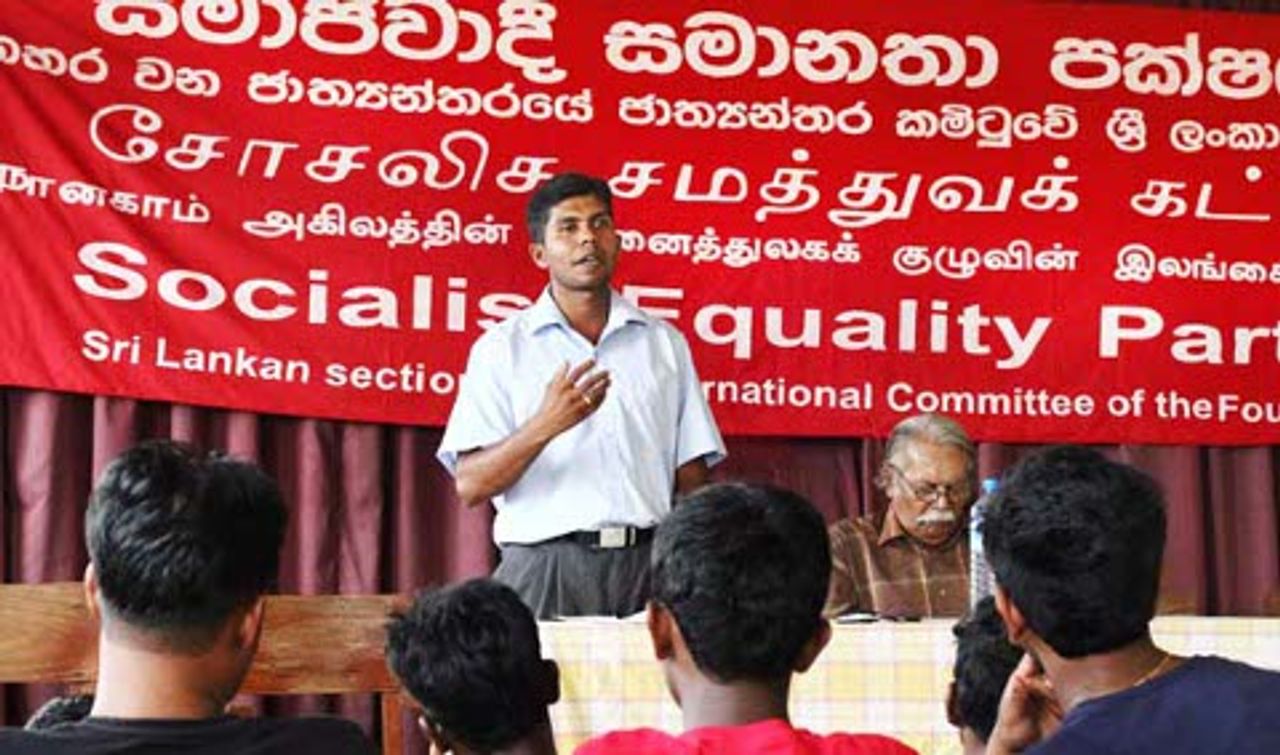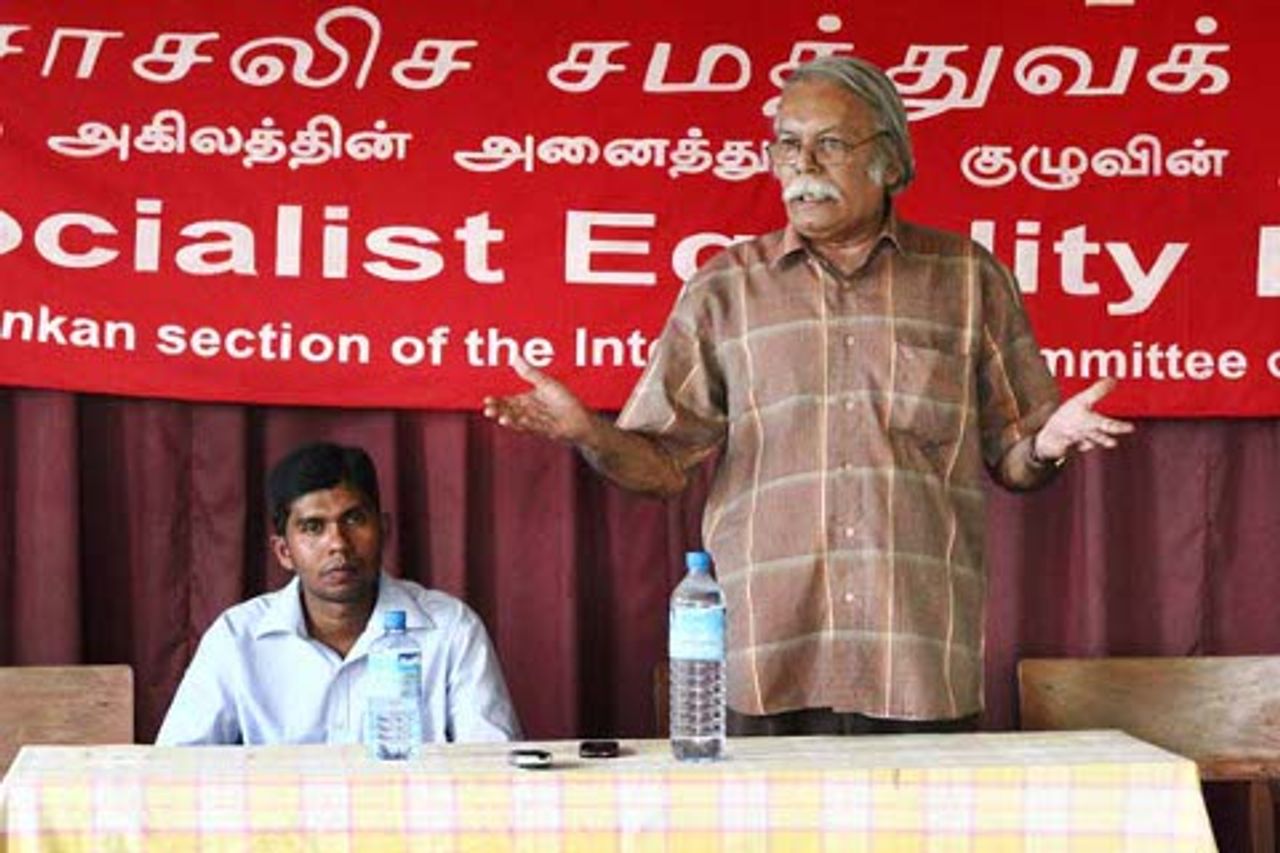The Socialist Equality Party (SEP) and International Students for Social Equality (ISSE) held a successful public meeting in Chilaw on Sri Lanka’s north-west coast on June 30. The meeting was attended by fishermen, workers and youth.
SEP and ISSE members campaigned in several Chilaw fishing communities, including the Thoduwawa and Wella areas, in the days before the meeting. Over 3,000 leaflets were distributed on the recent suicide of a fisherman who was wounded by police in February during protests against sharp oil price rises and other government austerity measures.
ISSE convenor Kapila Fernando, who chaired the meeting, explained that the police attacks on protesting fishermen last February were part of a broader offensive on working people and youth by the Sri Lankan government.
 Kapila Fernando
Kapila Fernando“Faced with a growing trade deficit, the Rajapakse administration is desperately dependent on IMF loans and is slavishly implementing austerity measures dictated by international finance capital.
“Fishermen have shown that they are not prepared to bow down before these attacks,” Fernando said, “but their brave and determined struggle lacked the crucial political perspective. This is why the government was able to crush demonstrations through the use of brutal military-police methods.”
Fernando said it was necessary for fishermen, youth and working people as a whole to draw the necessary political conclusions and begin discussing a socialist programme to take forward their struggles.
SEP general secretary Wije Dias, the main speaker, reviewed recent political developments in Sri Lanka. Masses of people, he said, had been told by the Rajapakse government that the military defeat of the separatist Liberation Tigers of Tamil Ealam (LTTE) in May in 2009 would bring peace, prosperity and democracy.
 Wije Dias addressing meeting
Wije Dias addressing meeting“The government has not only shattered those hopes,” Dias said, “but it has unleashed a ferocious class war against all working people and the oppressed. It used the military and police to attack the free trade zone workers, who fought the proposed fraudulent private sector pension scheme in May last year. One worker, Rosen Chanaka, was killed and several dozen wounded.
“Less than a year later,” he added, “the government launched its attack on protesting fishermen who took to the streets against oil price increases.”
Dias explained the connection between the Rajapakse government attacks and the escalating world economic crisis engulfing every country, including Sri Lanka.
The drastic and continuing devaluation of the Sri Lankan rupee, a wage freeze, and increased taxes on essential commodities, he said, flowed directly from the deepening recessionary conditions of world capitalism.
“This development has opened up a new period of revolutionary struggles of working people and youth throughout the world with the initial eruptions beginning in North Africa and the Middle East early last year,” he said.
“The last word of those mass uprisings has not yet been uttered,” Dias warned, “and the social reverberations were echoed in working class struggles at the very centres of world capitalism—in the US and Europe.
“What we see in South Asia—in India, Pakistan, Bangladesh and Sri Lanka—is a similar entrance of the working class into the political arena to challenge the capitalist order. The crucial factor in the struggles, however, must not be ignored. That is, the lack of a revolutionary program and leadership,” he said.
Dias explained that the gap between the revolutionary struggles of working people and the political consciousness needed to overthrow capitalist rule would not be resolved spontaneously.
He pointed out that in addition to capitalist state repression, the ruling class mobilised their ideological forces to defend the profit system and this included various religious institutions which were particularly active in fishing communities.
“‘God’s Will’ had always been on the side of the exploiters and not with the oppressed seeking liberation,” Dias said. He was referring to the reactionary role played by the Catholic Church in the Chilaw area after police opened fire on protesting fishermen in February. Dias also condemned a directive by the church to the fishing community ordering residents not to speak to SEP campaigners or attend the public meeting. This “anti-democratic dictum,” he said, “must be rejected and fought against.”
Dias told the meeting that the trade unions, including those active among the fishermen, were all servile to the government and the church.
“The unions claim that it’s possible to pressure the government but this is no different to praying before an inanimate statue,” he said. “We have to wage a determined struggle, not only against the government but against its two main props, the church and the unions.”
Dias explained the necessity for fishermen and other workers to break from these organisations, and all the bourgeois political parties they support, and fight for the establishment of action committees, democratically elected by the workers and neighbourhood communities, to discuss a genuine program of struggle.
Dias concluded by explaining that the working class and the oppressed “need a revolutionary political party to fight for their interests on the basis of an international socialist program. The SEP is the only party that fights for this perspective.”
The general secretary’s address was followed by a lively question and answer session with important discussion on the SEP’s socialist program. A school teacher asked how it was possible to break the domination of the church. “Among the fishermen this influence is overwhelming. Even the police do not go there,” he said
In reply, Dias explained how the church and the police supplemented each other in defending capitalism.
“There is no need for the police to intervene if the church is able to bring workers’ struggles under its wing and control it to the satisfaction of the ruling class. But when that tactic fails, the police and the military are mobilised as was clearly seen in the fishermen’s struggle last February,” he said. Dias also explained the role played by the Catholic Church in supporting fascist dictatorships in Spain and Germany during the 1930s.
